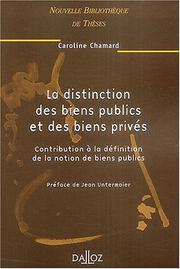| Listing 1 - 2 of 2 |
Sort by
|

ISBN: 2247057020 9782247057023 Year: 2004 Volume: .33 Publisher: Parijs Dalloz
Abstract | Keywords | Export | Availability | Bookmark
 Loading...
Loading...Choose an application
- Reference Manager
- EndNote
- RefWorks (Direct export to RefWorks)
Thesis (doctoral)--Université Jean-Moulin (Lyon III), 2002.
Public domain --- Public goods --- Property --- Things (Law) --- Biens collectifs --- Biens (Droit) --- Domaine public --- Goods, Public --- Finance, Public --- Welfare economics --- Free rider problem (Economics) --- Public domain - France --- Public goods - France --- Property - France
Book
ISBN: 2271062020 9782271062024 2271077974 Year: 2004 Publisher: CNRS Éditions
Abstract | Keywords | Export | Availability | Bookmark
 Loading...
Loading...Choose an application
- Reference Manager
- EndNote
- RefWorks (Direct export to RefWorks)
The book is structured around two thematic poles: goods and money. It is a question of giving an account of the processes of constitution of the value and of observing especially the dematerialization which is more and more intensely at work there. The departure is taken in a questioning on what is a good (in itself, private, public) to go towards what becomes the most general expression and the most mobile measure: money.The generalization of monetary valuation makes things more fluid, erases the traditional distinctions between types of goods and above all accompanies a process of socialization of utility which transforms the meaning and scope of having things to oneself. Value will have its life in circulation and its possession will be expressed as participation in the fluctuation of a medium.These observations sometimes provoke recourse to “strong” theories of valuation, capable of bringing back to more intuitive visions: however, envy and mimetic desire may well be at the root of value, the dynamics of monetary exchange and especially the centralization of the sharing of the social product as a monetary product opens up problems that anthropological intuition is no longer sufficient to clarify. Finally, the study of financial markets offers, at the extreme of dematerialization, an illustration of the perplexities encountered by any attempt to break the fence on themselves of the financial medium's computational processes. Attempts to import standards there seem doomed to failure.
Happiness --- Money --- Quality of life --- #SBIB:316.7C120 --- Life, Quality of --- Economic history --- Human ecology --- Life --- Social history --- Basic needs --- Human comfort --- Social accounting --- Work-life balance --- Currency --- Monetary question --- Money, Primitive --- Specie --- Standard of value --- Exchange --- Finance --- Value --- Banks and banking --- Coinage --- Currency question --- Gold --- Silver --- Silver question --- Wealth --- Gladness --- Emotions --- Cheerfulness --- Contentment --- Pleasure --- Well-being --- Cultuursociologie: algemene en theoretische werken --- Intangible property --- Public goods --- Capital market --- Circular velocity of money --- Valeur --- Biens incorporels --- Biens collectifs --- Marché financier --- Monnaie --- Circulation --- Quality of Life --- Money. --- Quality of life. --- Happiness. --- Business & Economics --- théorie de la valeur --- monnaie --- dématérialisation (finance) --- monétarisation --- finance
| Listing 1 - 2 of 2 |
Sort by
|

 Search
Search Feedback
Feedback About UniCat
About UniCat  Help
Help News
News